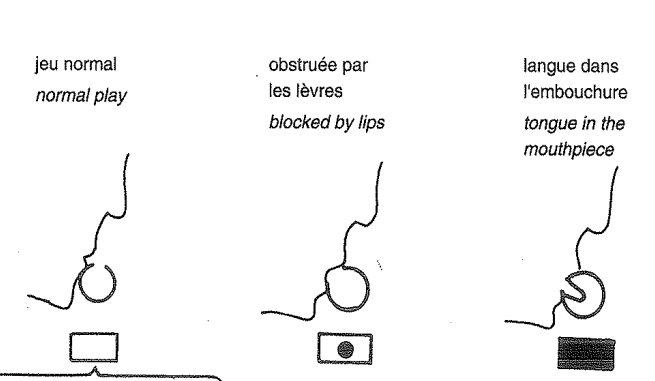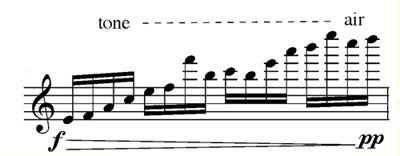There are several categories of potential trouble areas between composers and intstrumentalists:
1) Basic orchstration mistakes
2) Unfamiliarity (on either side) with a particular extended technique or effect
3) Unclear notation
What I am about to say may seem a bit didactic and Miss Mannerish, but really, it’s common sense. And as you may gather, I’ve had enough bad experiences to know what works and what doesn’t. I’m all ears for other ideas though.
Flutists, unless you are dealing with a composer/performer, you are the expert of your instrument and in a possible position to educate the composer. See your role as that of an educator, but use it with care because no one likes to feel patronised. To say simply “this is impossible” is very unproductive, even when it comes to a simple mistake such as a low C on the piccolo.
When faced with difficulty, the first step is to find an alternative. It is sometimes useful to take the initiative and suggest one yourself. As in all possible conflict situations, it is better to retain the “I” message rather than the “you” message. For example: I naively expect composers to know basic orchestration rules for flute and piccolo; therefore I am constantly disappointed. What to do? Some example suggestions: “could I take this low C up an octave? My standard piccolo only plays to low D.” or “given the (lack of) time we have, I would much prefer to play this rapid 4th octave passage on the piccolo rather than on the flute.” or “on this high C, I can achieve a much nicer pianissimo on the piccolo rather than on the flute.” The composer will most likely get the idea.
Articulation of staccato notes is another difficulty I run into with composers (and even conductors). On the lowest notes, the flute has a long resonating tube, and this takes time to speak. Some head joint cuts are designed so this register speaks loudly and easily. One can always strive to do better, and there are many exercises for the improvement of this technique. However, if you run into serious trouble trying to match the length of notes with string instruments or electronic sounds, you do have an acoustical excuse. If you see an alternative, suggest it. If not, express your willingness to work on improvement, but show the composer the length of tube required to resonate (and thus the physical limitations).
Often, when puzzling over an extended technique, rather than say “this is impossible” or “I can’t do this”, it helps to ask what the composer actually wants acoustically. Is there another technique which you can do which would be just as or more effective? Or ask where s/he got the technique from. Was it from another player whom you could simply contact for advice? Was it from a book? Were acoustical considerations overlooked such as the difference between a B foot and a C foot, or the difference between any two flutes or flutists?
Most composers I have worked with are very open and eager to look for solutions together. I once experienced a misunderstanding in an ensemble piece where I was faced with a passage of rapid, high whistle tones (notated exactly so: “whistle tone”) marked forte. The composer, Beat Furrer, actually wanted these sounds loud, which is an acoustical impossibility. He insisted, however, that the previous player had achieved this. I asked him what the previous player had actually done, then tried out a few things according to his description. It turned out that what he wanted were overblown harmonics with a lot of air, which in the context of this ensemble piece did give a whistling effect. So these effects were not whistle tones as I had learned them, nor as they appear in textbooks. I pointed this out to the composer, who did not take my point or make any “correction” in the part. As long as we had found the acoustic solution together, he was satisfied his notation had produced the results he wanted. What to do? In this case, I decided I had done my “duty” by pointing out a possible misunderstanding for the next flutist. To have taken “educator” role too far would have just meant getting into an argument (which I would have undertaken had this been a solo piece).
This is perhaps a long way of saying to my fellow flutists: let’s work together with composers to encourage the following:
- a more standardized notation for extended techniques
- a good working score for the next performer who comes along!






